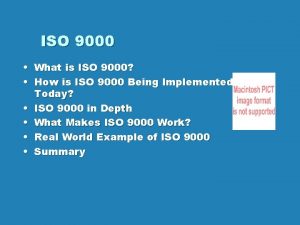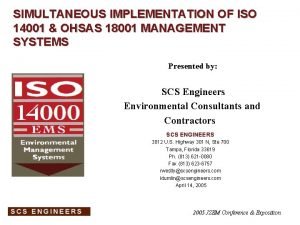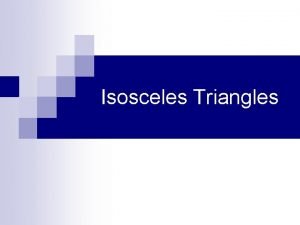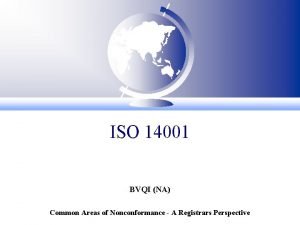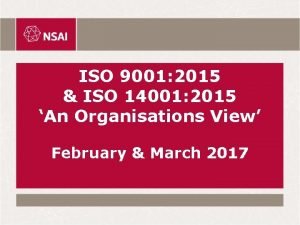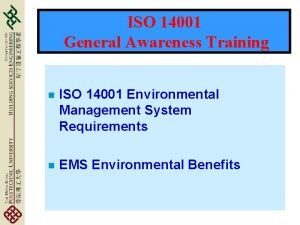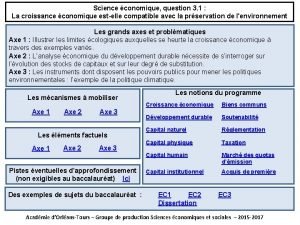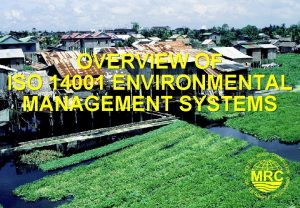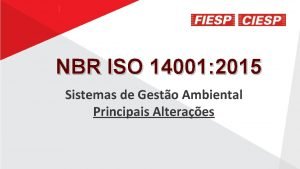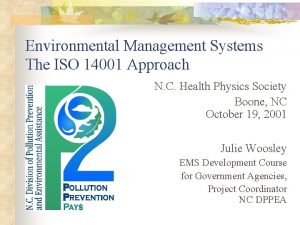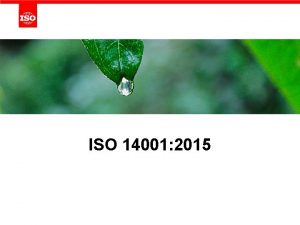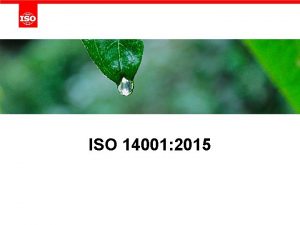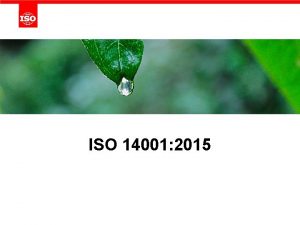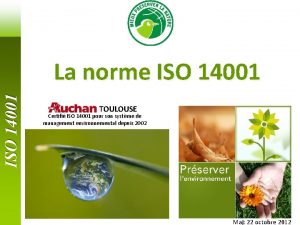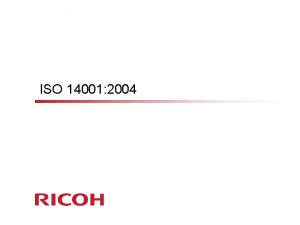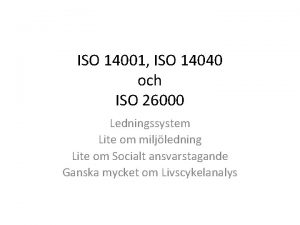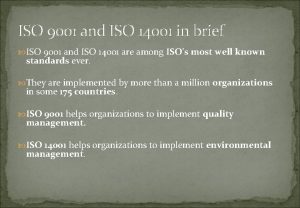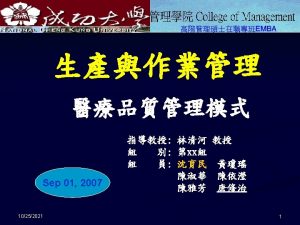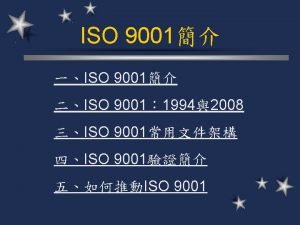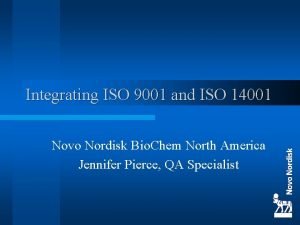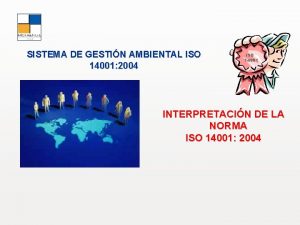ISO 14001 ISO 14001 is among ISOs most















- Slides: 15

ISO 14001

ISO 14001 is among ISO's most well known standards. It is implemented by more than a million organisations. ISO 14001 helps organisations to implement Environmental Management.

Environmental Management ISO 14001 is the standard for Environmental Management. This means what the organisation does to: - Minimise harmful effects on the environment caused by its activities. - Conform to applicable regulatory requirements. - Achieve continual improvement of its environmental performance.

Generic Standard ISO 14001 is a generic standard. Generic means that the same standards can be applied: • To any organisation, large or small, whatever its product or service. • In any sector of activity.

Management Systems A Management system (in the context of the environment) means what the organisation does to manage its processes or activities in order that; • Compliance obligations are complied with. • Environmental objectives are satisfied

Management Systems (cont. ) Large organisations or ones with complicated processes, could not function well without Management Systems. Companies in such fields as aerospace, automobiles, defence or health care devices have been operating Management Systems for years. The ISO 14001 Management System standard now makes these successful practices available for all organisations.

Processes, not products • ISO 14001 concerns the way an organisation manages those activities that have an impact on the environment. • It is not a product standard. • It is not a service standard. • It is a process standard. • It can be used by product manufacturers and service providers.

Certification and registration • Certification is known in some countries as registration. • It means that an independent, external body has audited an organisation’s Management System and verified that it conforms to the requirements specified in the ISO 14001 standard. • ISO does not carry out certification and does not issue or approve certificates.

Accreditation • Accreditation is like certification of the certification body. • It means the formal approval by a specialised body - an accreditation body - that a certification body is competent to carry out ISO 14001 certification in specified business sectors. • Certificates issued by accredited certification bodies - and known as accredited certificates - can be perceived in the market as having increased credibility. • ISO does not carry out or approve accreditations.

Certification not a requirement • Certification is not a requirement of ISO 14001. • The organisation can implement and benefit from an ISO 14001 system without having it certified. • The organisation can implement an ISO 14001 compliant system for its internal benefits without spending money on a certification programme.

Certification is a business decision Certification is a decision to be taken for business reasons: e. g. • If it is a contractual, regulatory or market requirement. • If it meets customer preferences. • It is part of a risk management programme or if it motivates staff by setting a clear goal.

ISO does not certify • ISO does not carry out ISO 14001 certification. • ISO does not issue certificates. • ISO does not accredit, approve or control the certification bodies. • ISO develops standards and guides to encourage good practice in accreditation and certification.

The ISO 14000 family • ISO 14001 is the standard that gives the requirements for an Environmental Management System. • ISO 14001: 2015 is the current version. • It is the only standard in the ISO 14000 family that can be used for certification. • The ISO 14000 family includes other standards that can help an organisation with specific aspects such as auditing, environmental labelling or life cycle analysis.

Benefits of ISO 14001 • Common language for dealing with customers and suppliers worldwide in B 2 B. • Increased efficiency and effectiveness. • Model for continual improvement. • Model for satisfying customers and other stakeholders.

Benefits of ISO 14001 (cont. ) • Addresses environmental concerns of customers and public and complies with government regulations. • Sustainable business. • Qualifies suppliers to enter global supply chains. • Transfer of good practice to developing countries.
 Norma iso 9000
Norma iso 9000 Ohsas 18001 iso 14001 comparison
Ohsas 18001 iso 14001 comparison Opposite angles are equal
Opposite angles are equal Isos holt
Isos holt The definition of isosceles triangle
The definition of isosceles triangle 6-6 properties of kites and trapezoids answer key
6-6 properties of kites and trapezoids answer key Kite order of rotational symmetry
Kite order of rotational symmetry Answer
Answer Isos holt
Isos holt Ford iso 14001
Ford iso 14001 Iso 9001;2015
Iso 9001;2015 17 elements of iso 14001
17 elements of iso 14001 Exemple politique environnementale iso 14001 version 2015
Exemple politique environnementale iso 14001 version 2015 Iso 14001 environmental policy examples
Iso 14001 environmental policy examples Nbr iso 14001 2015
Nbr iso 14001 2015 Iso 14001 environmental policy statement examples
Iso 14001 environmental policy statement examples
